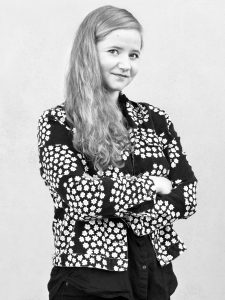Olga Juutistenaho

Kurzvita
- geb. 1991 in Tampere, Finnland
- seit 2022 Wissenschaftliche Mitarbeiterin, DFG-Graduiertenkolleg „Identität und Erbe“, TU Berlin
- 2018-2022 M.Sc. Architektur, Aalto-Universität, Helsinki, Finnland
- 2020-2022 Redaktionssekretärin, The Finnish Journal of Urban Studies (Yhdyskuntasuunnittelu)
- 2017-2021 M.Sc. Landschaftsarchitektur, Aalto-Universität
- 2018-2019 Austauschstudium, Urban Design, TU Berlin
- 2014-2017 B.Sc. Landschaftsarchitektur, Aalto-Universität
- 2011-2014 B.Sc. Architektur, Technische Hochschule Chalmers, Göteborg, Schweden
Burying an uncomfortable past: German war cemeteries in Finland as spatializations of memory culture and politics (working title)
My dissertation examines German war cemeteries in Finland as mirrors of different memory cultures. German war cemeteries are a global phenomenon: there are over 830 burial sites in 45 countries with graves of 2.8 million dead soldiers. For Germany, these spaces represent a difficult heritage, reminding of the country’s perpetrator role in two World Wars. Despite their uncomfortable nature, the maintenance of these graves is regulated by German constitution as a public duty. Furthermore, they are internationally protected by the Geneva convention of 1949.
During World War II, Finland was the only democracy to fight alongside Nazi Germany. This alliance is one of the most contested aspects of Finnish 20th century history. In many ways, the wartime presence of Germans has been marginalized in Finnish memory culture. Still, several spatial traces of this past remain. In Finland, there are currently three cemeteries in which German war dead from WWII are buried. Two of them, Norvajärvi in Rovaniemi and Honkanummi in Vantaa, are designated German war cemeteries, while the third site, Hietaniemi in Helsinki, is a memorial integrated with the largest Finnish war cemetery.
My research analyses these three cemeteries at the intersection between Finnish, German, and transnational memory cultures. Whose heritage are they and for whom can they be considered difficult heritage? The starting point is a spatial analysis based on site visits and original planning documents, complemented with a qualitative analysis of authentic archival traces.
Publikationen (Auswahl):
Juutistenaho, O. (2025). Köyhä, mutta seksikäs kaupunki gentrifikaation kourissa: vuokra-asunnon haun ongelmallisuus 2020-luvun Berliinissä. Yhdyskuntasuunnittelu – The Finnish Journal of Urban Studies, 62(4), 83–91. https://doi.org/10.33357/ys.155699
Juutistenaho, O. (2024). Monien tarinoiden kaupunki: narratiivit Helsingin ranta-alueiden suunnittelussa. Yhdyskuntasuunnittelu – The Finnish Journal of Urban Studies, 62(2-3), 74-76. https://journal.fi/yhdyskuntasuunnittelu/article/view/147163
Juutistenaho, O. (2024). The end of spatialised Finlandisation? The fate of Soviet statues in Finland since 2022. Kunsttexte.de, 2024(1). https://doi.org/10.48633/ksttx.2024.1.102628
Vorträge (Auswahl)
“Global remembrance and local oblivion: German war cemeteries in Finland as spatializations of contrasting memory cultures”. São Paulo School of Advanced Science on University, Memory and Reparation. Universität São Paulo, 2.7.2025.
“German bodies in Finnish ground: Whose difficult heritage?”. Die 8. Jahrestagung des Graduiertenkollegs Identität und Erbe. Technische Universität Berlin, 7.11.2024.
“Troubled spaces: narrating and interpreting World War II through two war cemeteries in Helsinki”. EAUH Conference 2024 Cities at the Boundaries. Universität Ostrava, 5.9.2024.
”Tuntematon sotilashautausmaa: vaikea kulttuuriperintö osana muuttuvaa kaupunkia”.
(“The unknown war cemetery: difficult heritage as a part of a changing city”.)
Kaupunkitutkimuksen päivät, Urban Studies Conference. Universität Helsinki, 24.5.2024.
“German World War II military cemeteries in Finland at the intersection of national and transnational memory cultures”. ASEN Conference 2024 Nationalism and Memory. Universität Edinburgh, 9.4.2024.
“The German war cemetery Honkanummi in Vantaa, Finland as uncomfortable and neglected heritage”. Spring School Uncomfortable Heritage in the Baltic Sea Region and beyond. Universität Szczecin, 11.3.2024.
“The end of (spatialized) Finlandization? The fate of Soviet statues in Finland in 2022”.
War on monuments: Debates over Russian/Soviet heritage in Eastern and Central Europe since 2022.
Estnische Kunstakademie (online), 16.5.2023.
“Kiveen hakattuja tulkintoja – suomalaisen kaupunkitilan menneisyyden narratiivit”.
(”Interpretations etched in stone – narratives of the past in Finnish public space”).
Kaupunkitutkimuksen päivät, Urban Studies Conference. Universität Turku, 5.5.2023.
“Making amends with the past – approaching cultural trauma through built heritage”.
ATUT, 14th Symposium of Architectural Research. Universität Tampere, 20.4.2022.